Russia sees itself as the successor to the Byzantine Empire, the champion of Christianity, a leader of an assembly nations who is to unseat the failed American hegemony over Europe, create a New European Order, with Russia at its center, and take on the burden of world problems. The Bible paints the same picture.
This week Russian Foreign Minister Sergey Lavrov wrote an article for Global Affairs magazine where he reflected on Russia’s past and future.
In the lengthy article he attempted to correct the picture painted by western propaganda of Russia’s development and current place in the world.
Russia the successor to the Byzantine Empire:
Lavrov described the rise of the Kievan Rus its adoption of Christianity in 988, over 1028 years ago. He showed how Russia was the defender of Christianity during the Mongolian invasion and successor to the Byzantine Empire:
Rus bent under but was not broken by the heavy Mongolian yoke, and managed to emerge from this dire trial as a single state, which was later regarded by both the West and the East as the successor to the Byzantine Empire that ceased to exist in 1453. An imposing country stretching along what was practically the entire eastern perimeter of Europe, Russia began a natural expansion towards the Urals and Siberia, absorbing their huge territories.
Lavrov’s understanding of Russia’s development is in keeping with John Thomas, and other Bible prophecy students, who wrote about the origins of Russia from a Biblical perspective. It is the successor to the Byzantine Empire, and became the dragon of Revelation when the Russian ruler assumed the title of Czar or Caesar, and Russia became the third Rome.
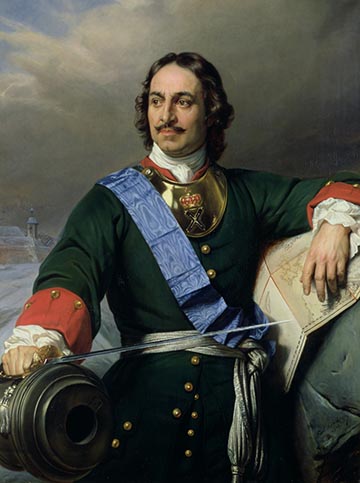
Peter the Great, Czar of Russia
Lavrov reflected on the glory of Russia’s previous leaders such as Peter the Great, who put Russia in the center of political decision making in Europe:
Relying on tough domestic measures and resolute, and successful, foreign policy, Peter the Great managed to put Russia into the category of Europe’s leading countries in a little over two decades. Since that time Russia’s position could no longer be ignored. Not a single European issue can be resolved without Russia’s opinion.
He wrote of Catherine the Great who put Russia into the center of military decision making in Europe:
Russia’s size, power and influence grew substantially under Catherine the Great when, as then Chancellor Alexander Bezborodko put it, “Not a single cannon in Europe could be fired without our consent.”
These reflections are by design, the implication being that moving forward, no European issues will be resolved without Russian’ opinion, and no guns will be fired in Europe without Russian consent. Anything else would be tragic, as he went on to state.
Attempts to Unite Europe without Russia have been Tragic
Reflecting on the current situation with the European Union and NATO, Lavrov drew on historical attempts to unite Europe under Napoleon which did not include Russia in the decision making:
During at least the past two centuries any attempts to unite Europe without Russia and against it have inevitably led to grim tragedies, the consequences of which were always overcome with the decisive participation of our country. I’m referring, in part, to the Napoleonic wars upon the completion of which Russia rescued the system of international relations that was based on the balance of forces and mutual consideration for national interests and ruled out the total dominance of one state in Europe.
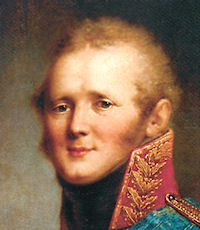
Czar Alexander I called for
a common European policy
According to Lavrov, Russia saved the day bay in Napoleonic times. Quoting the Russian emperor Alexander I he drew an analogy with today:
“there can be no more English, French, Russian or Austrian policy. There can be only one policy – a common policy that must be accepted by both peoples and sovereigns for common happiness.”
This vision of the Czars, and now of the current leadership of Russia is also in keeping with Bible prophecy. Ezekiel talks of an alliance nations that spans Europe and Russia:
“And the word of the LORD came unto me, saying, Son of man, set thy face against Gog, the land of Magog, the prince Rosh [RSV] of Meshech and Tubal, and prophesy against him… (Ezekiel 38:2-3)
Historians identify Rosh with Russia, Meshech with the Muscovy people who gave their name to Moscow, Tubal with the area of Tobolsk and Siberia, the land of Magog with what we knew as Eastern Europe, and Gomer with France and Germany. Again John Thomas, writing in Elpis Israel looked for the development of the Czar’s and the current Russian administration’s vision of Europe:
“Gogue of the land Ma-gogue”, that is, styling the ruler of Magogue by the latter syllable of the name of the country over which he rules. We have seen that Magogue is the region extending from the Ros, or Russia, to the Rhine, comprehending Wallachia, Transylvania, Hungary, and Germany. Of course, the prophecy must be future, because the Prince of the Ros is the Gogue of Magogue; and as yet no Emperor of Russia has been also Emperor of Germany, etc.” (John Thomas, 1848. Elpis Israel, p385)
Ezekiel adds to this confederation Western Europe by the addition of Gomer and all his bands in verse 6:
“Gomer, and all his bands; the house of Togarmah of the north quarters, and all his bands: and many people with thee.” (Ezekiel 38:6)
Again, Thomas draws upon ancient historians to make his conclusion on Gomer and his bands:
In this general description may easily be discerned that extended portion of the West of Europe, comprehending ancient Gaul, Belgium, and the countries bordering upon them, which constituted in our day the Napoleon empire. Gomer, then, points immediately to France… Their country, according to the best modern geographers and historians, was bounded on the north by the Ocean; on the west by the Ocean and the Rhine; on the south by the Maine; and on the east by the Weser (A river running through Germany).”
Lavrov’s vision of Russia united with Europe is in keeping with the picture painted by Ezekiel in chapter 38.
These nations are not just united geographically, militarily and politically but by a common ideology.
Out of the Mouth of the Dragon
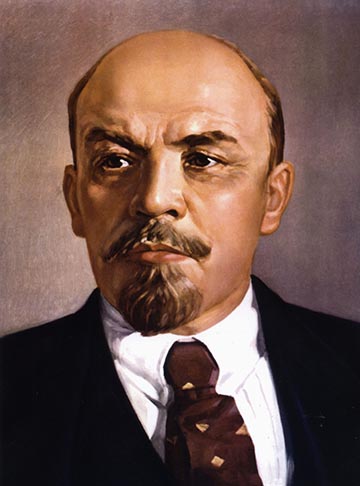
Lenin, leader of the Russian Revolution
Lavrov then countered Western criticism that painted the Russian Revolution of 1917 “as a barbaric coup that dragged down all of European history.” He pointed out that the Russian Revolution was part of a movement that swept Europe:
Undoubtedly, the Russian Revolution was a major event which impacted world history in many controversial ways. It has become regarded as a kind of experiment in implementing socialist ideas, which were then widely spread across Europe. The people supported them, because wide masses gravitated towards social organisation with reliance on the collective and community principles.
Lavrov’s assessment of the Russian Revolution is in harmony with the Biblical prophecies about the “socialist” experiment that would effect Europe. Revelation 16 describes the threefold doctrine that was incubated by the French Revolution and burst out across Europe:
“And I saw three unclean spirits like frogs come out of the mouth of the dragon, and out of the mouth of the beast, and out of the mouth of the false prophet. For they are the spirits of devils, working miracles, which go forth unto the kings of the earth and of the whole world, to gather them to the battle of that great day of God Almighty.” (Revelation 16:13–14)
The “unclean” teachings described as spirits of the demoniac or mad men would effect the kings of the earth and the whole world, eventually bringing them to the battle of Armageddon. This is the doctrine of “liberty, equality and fraternity”, which is a false doctrine, as the Bible states:
“While they promise them liberty, they themselves are the servants of corruption: for of whom a man is overcome, of the same is he brought in bondage.” (2 Peter 2:19)
Lavrov’s reflection on Communism is an national admission to being infected by the spirit of the French Revolution, which he holds not as a stain on the Russian society, but as a defining element:
It is appropriate to recall yet another anniversary, which will be marked next year – the 100th 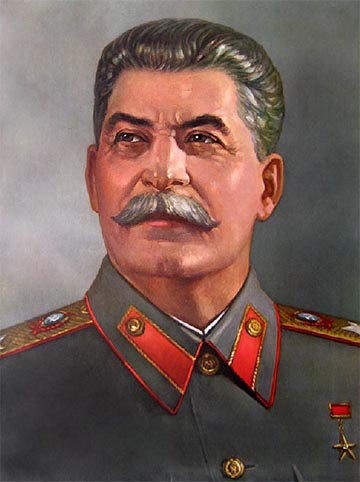
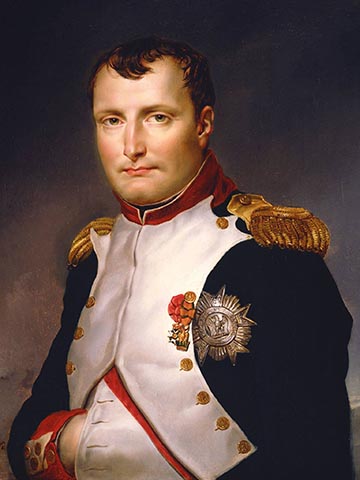
Stalin and Napoleon who both
emerged as dictators following
bloody revolutions in
Russia and France
Without a doubt, the Revolution of 1917 and the ensuing Civil War were a terrible tragedy for our nation. However, all other revolutions were tragic as well. This does not prevent our French colleagues from extolling their upheaval, which, in addition to the slogans of liberty, equality and fraternity, also involved the use of the guillotine, and rivers of blood.
Undoubtedly, the Russian Revolution was a major event which impacted world history in many controversial ways. It has become regarded as a kind of experiment in implementing socialist ideas, which were then widely spread across Europe.
This is fair comment. In western opinion, Russian Revolution, a revolution of the people resulting in the dictatorship of Joseph Stalin: bad – something to be demonized. French Revolution, a revolution steeped in the blood of the guillotine, resulting in the dictatorship of Napoleon Bonaparte: good – something to be celebrated. The point is, both revolutions were bloody, resulted in dictatorships, but were the source of “implementing socialist ideas which were widely spread across Europe”. In other words, The frog spirits came out of the the mouth of the European Beast, and out of the mouth of the Russian Dragon.
Changing Masters
Remarkably, Lavrov then describes the collapse of the Soviet Union and the reforming of the nations released from Soviet influence. He stated:
If you take an unbiased look at the smaller European countries, which previously were part of the Warsaw Treaty, and are now members of the EU or NATO, it is clear that the issue was not about going from subjugation to freedom, which Western masterminds like to talk about, but rather a change of leadership. Russian President Vladimir Putin spoke about it not long ago. The representatives of these countries concede behind closed doors that they can’t take any significant decision without the green light from Washington or Brussels.
This is in keeping with the Biblical principle:
“Know ye not, that to whom ye yield yourselves servants to obey, his servants ye are to whom ye obey; whether of sin unto death, or of obedience unto righteousness?” (Romans 6:16)
All human forms of government are corrupt and fall under the “sin unto death” category, whether communist, capitalist or socialist as they are governed by men. As Bible believes we look for a new form of government:
“Nevertheless we, according to his promise, look for new heavens and a new earth, wherein dwelleth righteousness.” (2 Peter 3:13)
NATO’s Demise = United Europe
Lavrov, reflecting on how things went in Europe sees a tragedy in not involving Russia in the European Union:
We had a practical chance to mend Europe’s divide and implement the dream of a common European home, which many European thinkers and politicians, including President Charles de Gaulle of France, wholeheartedly embraced. Russia was fully open to this option and advanced many proposals and initiatives in this connection. Logically, we should have created a new foundation for European security by strengthening the military and political components of the Organisation for Security and Cooperation in Europe (OSCE).
Lavrov identifies the problem as being NATO:
Unfortunately, our Western partners chose differently. They opted to expand NATO eastward and to advance the geopolitical space they controlled closer to the Russian border. This is the essence of the systemic problems that have soured Russia’s relations with the United States and the European Union. It is notable that George Kennan, the architect of the US policy of containment of the Soviet Union, said in his winter years that the ratification of NATO expansion was “a tragic mistake.”
Lavrov sees Western policy as the core issue in a divided world:
The underlying problem of this Western policy is that it disregarded the global context. The current globalised world is based on an unprecedented interconnection between countries, and so it’s impossible to develop relations between Russia and the EU as if they remained at the core of global politics as during the Cold War….
We see how the United States and the US-led Western alliance are trying to preserve their dominant positions by any available method or, to use the American lexicon, ensure their “global leadership”. Many diverse ways of exerting pressure, economic sanctions and even direct armed intervention are being used. Large-scale information wars are being waged. Technology of unconstitutional change of governments by launching “colour” revolutions has been tried and tested.
He lays the blame for the destruction of the established international system at the feet of America, arguing:
“…as if it was us who bombed Yugoslavia in 1999 in violation of the UN Charter and the Helsinki Final Act, as if it was Russia that ignored international law by invading Iraq in 2003 and distorted UN Security Council resolutions by overthrowing Muammar Gaddafi’s regime by force in Libya in 2011.
His conclusion is that America thinks it is the only game in town, and its actions have caused the current instability in the world. In his opinion, America has become the protagonist of George Orwell’s novel, originally intended to condemn the Soviet Union:
It is based on the simple and even primitive logic that only Washington can set the tune in world affairs. In line with this logic, the principle once formulated by George Orwell and moved to the international level, sounds like the following: all states are equal but some states are more equal than others. However, today international relations are too sophisticated a mechanism to be controlled from one centre. This is obvious given the results of US interference: There is virtually no state in Libya; Iraq is balancing on the brink of disintegration, and so on and so forth.
Russia the Savior
Lavrov then goes on to point out Russia’s leadership in solving problems, in contrast to America’s leadership in creating them:
A reliable solution to the problems of the modern world can only be achieved through serious and honest cooperation between the leading states and their associations in order to address common challenges…. We know from experience that when these principles are applied in practice, it is possible to achieve specific and tangible results, such as the agreement on the Iranian nuclear programme, the elimination of Syrian chemical weapons, the agreement on stopping hostilities in Syria, and the development of the basic parameters of the global climate agreement.
The solution, plainly put, is for nations to join Russia in their approach to world affairs which is working, and leave the American sphere and it’s approach to world affairs which is making things worse:
…Russia is fighting not against someone, but for the resolution of all the issues on an equal and mutually respectful basis, which alone can serve as a reliable foundation for a long-term improvement of international relations.
Our most important task is to join our efforts against… very real challenges, among which the terrorist aggression is the most pressing one…. The Russian President called for forming a broad-based front in order to defeat the terrorists militarily.
Lavrov points out that Russia’s tune is no different from the Vatican tune:
We believe that human solidarity must have a moral basis formed by traditional values that are largely shared by the world's leading religions. In this connection, I would like to draw your attention to the joint statement by Patriarch Kirill and Pope Francis, in which, among other things, they have expressed support for the family as a natural centre of life of individuals and society.
This is not surprising, since the third entity from which the frog spirits are to come is the False prophet as the book of Revelation States:
“And I saw three unclean spirits like frogs come out of the mouth of the dragon, and out of the mouth of the beast, and out of the mouth of the false prophet.” (Revelation 16:13)
Guiding an Assembly of Nations
According to Lavrov, the vision of Russia is for a new world order, a new European order that has Russia at its heart, and not America:
We continue to believe that the best way to ensure the interests of the peoples living in Europe is to form a common economic and humanitarian space from the Atlantic to the Pacific, so that the newly formed Eurasian Economic Union could be an integrating link between Europe and Asia Pacific.
Having already drawn the analogy between Napoleon and America as “one state” dominating Europe, his view of Russia is it is the nation that has acted legally and creatively to solve problems, and influence an “assembly of nations”:
Speaking about Russia's role in the world as a great power, Russian philosopher Ivan Ilyin said that the greatness of a country is not determined by the size of its territory or the number of its inhabitants, but by the capacity of its people and its government to take on the burden of great world problems and to deal with these problems in a creative manner. A great power is the one which, asserting its existence and its interest ... introduces a creative and meaningful legal idea to the entire assembly of the nations, the entire “concert” of the peoples and states. It is difficult to disagree with these words.
It is amazing to hear Sergey Lavrov, the Minister of Foreign Affairs for Russia for the past 12 years, painting of picture of Russia that Bible students have anticipated and written about for years. Ezekiel describes a Russia that will have nations “assembled” unto it:
“Be thou prepared, and prepare for thyself, thou, and all thy company that are assembled unto thee, and be thou a guard unto them.” (Ezekiel 38:7)
As we saw, Revelation tells us it is the humanist socialist doctrine that ultimately will gather the nations into the Middle East at the time of the end:
“And I saw three unclean spirits like frogs come out of the mouth of the dragon [Russia], and out of the mouth of the beast [Europe], and out of the mouth of the false prophet [the Vatican] . For they are the spirits of devils, working miracles, which go forth unto the kings of the earth and of the whole world, to gather them to the battle of that great day of God Almighty.” (Revelation 16:13–14)
We now see Russia standing up, and asking the nations of Europe to join its humanist crusade to solve world problems. One of the problems that both Russia, Europe and the Vatican all agree on is the Palestinian problem. The Bible indicates that they will “burden themselves” with this issue, and it will be their downfall:
“Behold, I will make Jerusalem a cup of trembling unto all people round about, when they shall be in the siege both against Judah and against Jerusalem. And in that day will I make Jerusalem a burdensome stone for all people: all that burden themselves with it shall be cut in pieces, though all people of the earth be gathered together against it.” (Zechariah 12:2-3)
So Russia’s plan to “to take on the burden of great world problems and to deal with these problems in a creative manner” has been predicted in Bible prophecy. The stage is being set for the “legal” and “just war” that will “gather all nations against Jerusalem to battle” (Zechariah 14:2).
The time is short. The end of all things, as at present constituted, is at hand. The long-expected, but stealthy, advent of the King of Israel is on the eve of becoming a fact.